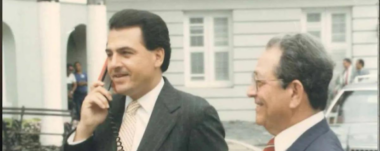Key Figures: Carlos Enrique Alvarado Briceño

In this section on outstanding figures of Costa Rica we talk about people who have contributed positively in the development of the country. This time we will talk about the contribution of Carlos Enrique Alvarado Briceño. The current Minister of Science and Technology was first of all one of the promoters of the first Costa Rican satellite, Project Irazú, when he was president of the Central American Association of Aeronautics and Space (ACAE).
Carlos Enrique Alvarado and Science
Carlos Enrique Alvarado Briceño’s career is the result of the possibilities that Costa Rica offers in terms of education. Born into a humble family in Aserrí, Carlos understood very early on that only study would open up opportunities for him.
10 Years of Work With The Irazú Project
Carlos Enrique Alvarado won a scholarship at the Instituto Tecnológico de Costa Rica where he became interested in the construction of the Costa Rican satellite, the Irazú project on which he worked for almost 10 years between 2009 and 2018. The objective was to demonstrate that the country had the capacity to successfully carry out highly complex space projects, which was proven.
The 10-centimeter diameter “nano” satellite was designed to monitor temperature, humidity and carbon dioxide fixation in order to analyze climate change. The satellite took six months to build and required another six months for testing. Irazu was then sent to Japan, where it underwent further testing at the Kyushu Institute of Technology before being shipped to the Japan Aerospace Exploration Agency for delivery to NASA.

The total cost of the project was US$500,000, much of which was contributed by ACAE. The Instituto Tecnológico de Costa Rica was responsible for providing the last $75,000 needed to complete the final stages, which was raised through crowdfunding in which 800 people participated.
The satellite launch can be seen here.
Harvard Scolarship And Morazán Project
In 2016 Carlos Enrique Alvarado obtained the John F. Kennedy scholarship at Harvard University where he obtained his post-graduate degree. This experience abroad gave him a new vision and more experience that he applied when he returned to work at the Costa Rican Institute of Electricity.
The satellite will be launched in 2018. At the same time, Alvarado was already working on the Morazán project to launch the first Honduran satellite, using the knowledge acquired with the Irazú project.
He then worked as a consultant for SICA, the Central American Integration System, before taking up his duties as Minister of Science and Technology in May 2022.
Costa Rica’s Science and Technology Challenges
Developing capacities in Costa Rica and Central America, says Alvarado, is a matter of survival. The situation is complicated for earthlings: climate change, inequalities in access to technology, in other words, it is a matter of developing national and regional capacities in order not to be left behind.
One of the priorities is theRicans in Science and Technology starting an implementation of 5G throughout the national territory. Another priority is to develop the training of Costa at a very early age.
Author: M. Barrantes in collaboration with Carlos Enrique Alvarado for Sensorial Sunsets
References
Navigate articles





